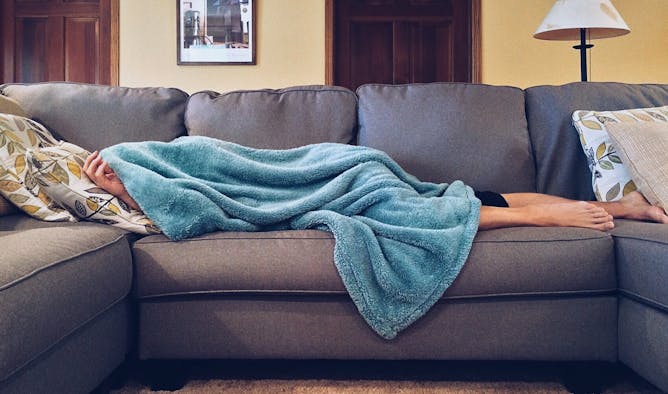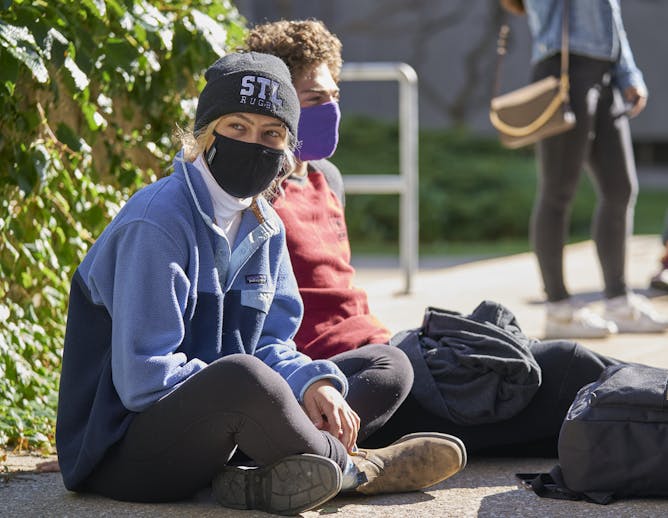|
Canadians are being encouraged to stay at home in many parts of the country to help prevent the spread of COVID-19. But it turns out staying home can have its own hazards, and they creep up a lot faster than you might think.
Reduced physical activity — the kind that happens when people spend their time indoors and don’t include exercise in their daily routine — is bad for your health. It’s not just losing muscle mass and gaining body fat, either: possible effects range from insulin resistance to declining mental health. And it happens alarmingly fast. It only takes a couple of weeks for inactivity to start taking a toll on the body.
Today in The Conversation Canada, McMaster University physiologist James McKendry highlights the dangers of spending too much time on the sofa, and discusses options for being physically active to stay strong and healthy through the long winter ahead.
Also today:
|

Being inactive even for short periods of time can affect health.
(Pixabay)
James McKendry, McMaster University
Most people know the benefits of physical activity. However, we tend to be less aware of how damaging inactivity can be, even for short periods — especially for older adults.
|

U.S. President Donald Trump speaks with reporters after participating in a video teleconference call with members of the military on Nov. 26, 2020, at the White House in Washington. He reiterated his baseless claims during the news conference that the Nov. 3 election was ‘rigged.’
(AP Photo/Patrick Semansky)
Chris Tenove, University of British Columbia; Spencer McKay, University of British Columbia
If citizens disbelieve the institutions that count ballots and the organizations that accurately report on those results, it will impossible to agree on what a legitimate election looks like.
|

First year Western University students Sarah Pignatelli and Mason Shearer wait for a COVID-19 test in London, Ont., on Sept. 19, 2020.
THE CANADIAN PRESS/Geoff Robins
Rod Knight, University of British Columbia; Marie Jauffret-Roustide, Inserm; Naseeb Bolduc, University of British Columbia; Pierre-julien Coulaud, University of British Columbia
Media depictions of youth during the pandemic are distorting the actual experiences, practices and attitudes of young adults during COVID-19, as well as the pandemic's impact on them.
|

Keeping busy during the pandemic by taking on a new hobby or tackling a home renovation project can help us get through challenging times.
(Shutterstock)
Mary Ann McColl, Queen's University, Ontario
The coronavirus pandemic has been a stressful and challenging time. But staying busy can help by creating a diversion, helping us to build community and strengthening our sense of self.
|

Teaching researchers and scientists communication skills — including social media proficiency — will help inform the public about new discoveries and research.
(Shutterstock)
Keroles Riad, Concordia University; Cristina Sanza, Concordia University; Nancy Hamdy, University of Toronto
Budget cuts and outsourcing content has affected the amount and quality of science journalism. Scientists should learn to communicate their own findings directly and clearly to the public.
|

Le mentorat n'est pas seulement bon pour la personne qui le reçoit. De nouvelles recherches suggèrent que ceux qui servent de mentors en bénéficient également.
Unsplash
Mostafa Ayoobzadeh, Concordia University; Kathleen Boies, Concordia University
Les recherches suggèrent que le mentorat peut être utilisé pour améliorer les compétences de leadership des membres juniors et plus expérimentés de toute organisation.
|
Culture + Society
|
-
Adrastos Omissi, University of Glasgow
How on earth did an obscure Roman social practice end up lending its name to a modern psychedelic?
|
|
COVID-19
|
-
Kathryn L Hopkins, University of the Witwatersrand; Glenda Gray, South African Medical Research Council
If the world is single-minded and focuses purely on combating one pandemic, forgetting others, the effects of other morbidity and mortality on healthcare systems will be seen for a long time to come.
|
|
Arts
|
-
John Willsteed, Queensland University of Technology
David Byrne redefined the idea of what a band onstage looks like. Spike Lee has made a film about Byrne and his band that stands up with the best.
|
|